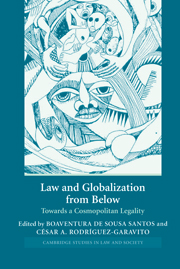Book contents
- Frontmatter
- Contents
- Notes on the contributors
- 1 Law, politics, and the subaltern in counter-hegemonic globalization
- PART ONE LAW AND THE CONSTRUCTION OF A GLOBAL ECONOMY OF SOLIDARITY
- 2 Beyond neoliberal governance: the World Social Forum as subaltern cosmopolitan politics and legality
- 3 Nike's law: the anti-sweatshop movement, transnational corporations, and the struggle over international labor rights in the Americas
- 4 Corporate social responsibility: a case of hegemony and counter-hegemony
- 5 Campaigning for life: building a new transnational solidarity in the face of HIV/AIDS and TRIPS
- 6 Negotiating informality within formality: land and housing in the Texas colonias
- 7 Local contact points at global divides: labor rights and immigrant rights as sites for cosmopolitan legality
- PART TWO TRANSNATIONAL SOCIAL MOVEMENTS AND THE RECONSTRUCTION OF HUMAN RIGHTS
- PART THREE LAW AND PARTICIPATORY DEMOCRACY: BETWEEN THE LOCAL AND THE GLOBAL
- Index
- References
3 - Nike's law: the anti-sweatshop movement, transnational corporations, and the struggle over international labor rights in the Americas
Published online by Cambridge University Press: 07 July 2009
- Frontmatter
- Contents
- Notes on the contributors
- 1 Law, politics, and the subaltern in counter-hegemonic globalization
- PART ONE LAW AND THE CONSTRUCTION OF A GLOBAL ECONOMY OF SOLIDARITY
- 2 Beyond neoliberal governance: the World Social Forum as subaltern cosmopolitan politics and legality
- 3 Nike's law: the anti-sweatshop movement, transnational corporations, and the struggle over international labor rights in the Americas
- 4 Corporate social responsibility: a case of hegemony and counter-hegemony
- 5 Campaigning for life: building a new transnational solidarity in the face of HIV/AIDS and TRIPS
- 6 Negotiating informality within formality: land and housing in the Texas colonias
- 7 Local contact points at global divides: labor rights and immigrant rights as sites for cosmopolitan legality
- PART TWO TRANSNATIONAL SOCIAL MOVEMENTS AND THE RECONSTRUCTION OF HUMAN RIGHTS
- PART THREE LAW AND PARTICIPATORY DEMOCRACY: BETWEEN THE LOCAL AND THE GLOBAL
- Index
- References
Summary
INTRODUCTION
Just as sweatshops have become the symbol of the perverse effects of neoliberal globalization, the transnational anti-sweatshop movement lies at the heart of the struggle for social justice in the global economy. In the global North, the reemergence of sweatshops in such cities as New York and Los Angeles entails the return of the economic and legal realities of the nineteenth century (Bonacich and Appelbaum 2000; Ross 1997). In the South, the exploitative labor conditions and the unfulfilled promise of employment and growth have turned maquilas into an icon of the failure of late twentieth-century neoliberalism. In bridging the North–South divide through highly plural, dynamic, and decentralized transnational advocacy networks (TANs), the anti-sweatshop movement holds out the prospect of a revamped, twenty-first century labor internationalism (Evans, forthcoming; Moody 1997).
Beyond its political and symbolic importance, the anti-sweatshop movement offers a privileged vantage point to examine the role of law in counter-hegemonic globalization for two reasons. First, in terms of social movement theory (Snow et al. 1986), the “framing” of the anti-sweatshop cause has crucially relied on law and legal discourse. Given that abuses committed in global sweatshops – from physical violence to sexual harassment and misery wages – undermine fundamental conditions of human dignity, TANs have framed their struggle as a vindication of basic human rights. This has not only lent a potent moral force to the movement but has also placed the mobilization of human rights rules and discourses at the center of TANs' strategies.
- Type
- Chapter
- Information
- Law and Globalization from BelowTowards a Cosmopolitan Legality, pp. 64 - 91Publisher: Cambridge University PressPrint publication year: 2005
References
- 19
- Cited by

